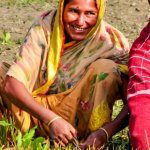By Elizabeth Bryan
Agricultural development policies and interventions that ignore gender dynamics miss opportunities to maximize benefits, including increasing resilience to climate change and variability. As more policy-makers and development practitioners acknowledge the importance of addressing gender in their work, they can draw on a growing body of research that highlights key entry points for more effectively integrating gender.
Read More...
The challenge of our lifetime: How to ensure nutrition for everyone under climate change
By Claire Davis and Jessica Fanzo
The connections between climate change, the global food system, and nutrition are woefully under-acknowledged. Yet the agriculture-food system is particularly vulnerable to climate change. For many regions, especially in the global South, it will be more and more difficult to produce enough nutritious, safe food for everyone in the future. This relationship is complex: climate change threatens our ability to feed a growing planet, but the food system also contributes significantly to greenhouse gas emissions (GHGs).
A new IFPRI discussion paper, “Climate Change and Variability: What are the Risks for Nutrition, Diets, and Food Systems?”, examines these connections in order to provide an overview of the existing research landscape. The paper uses a food systems approach as it analyzes the bidirectional relationship between food and climate along every step of the food value chain, from a farmer’s seed supply to a consumer having a meal.
Read More...


